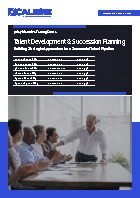| Date | Venue | Fee | |
|---|---|---|---|
| 22 Jun - 26 Jun 2026 | Riyadh – KSA | $ 5,950 | Register Now |
| 24 Aug - 28 Aug 2026 | Dubai – UAE | $ 5,950 | Register Now |
| 14 Sep - 18 Sep 2026 | London - UK | $ 5,950 | Register Now |
| 30 Nov - 04 Dec 2026 | New York - USA | $ 5,950 | Register Now |
About the Course
Effective talent development goes beyond traditional aspects. It involves a strategic approach to identifying, nurturing, and empowering individuals who demonstrate potential for leadership and key roles within an organisation. By fostering a culture that values continuous learning and development, businesses can enhance employee engagement and retention and ensure a steady supply of skilled personnel prepared to step into critical positions as needed.
Succession planning, another cornerstone of organisational resilience, involves proactively identifying and preparing successors for key roles across various levels of an organisation. It encompasses systematically identifying critical roles, developing potential successors, and implementing strategies to ensure a smooth transition during leadership changes or unexpected departures. By establishing robust succession plans, organisations can mitigate risks associated with talent gaps, enhance continuity, and sustain momentum in achieving strategic objectives.
The Talent Development and Succession Planning training course has emerged as indispensable for organisations aiming to cultivate a robust pipeline of capable leaders and professionals. It is designed to equip delegates with the essential knowledge and tools to navigate the complexities of talent management effectively, focusing on both short-term talent development and long-term succession planning strategies.
Throughout this training program, delegates will explore practical frameworks, case studies, and tools tailored to facilitate effective talent development and succession planning processes within their respective organisations. The focus will be on fostering strategic foresight, agility in talent deployment, and alignment with broader organisational goals, empowering delegates to drive impactful talent strategies that contribute to long-term organisational success.
Core Objectives
The delegates will achieve the following objectives:
- Understand the key principles and theories of talent development and succession planning
- Identify the critical components of an effective talent pipeline
- Discuss the strategic alignment of succession planning with organisational goals
- Apply tools and techniques for talent assessment and development
- Implement structured succession planning processes within organisational contexts
- Analyse organisational talent needs and gaps to develop targeted talent development strategies
- Assess the impact of talent mobility and career development programs on employee engagement and retention
- Design personalised talent development roadmaps for high-potential employees
- Adapt talent development and succession planning strategies to meet changing organisational and industry landscapes
Training Approach
This training course integrates interactive lectures, case studies, and hands-on exercises to ensure active engagement and practical application of concepts. Delegates will collaborate in group discussions and simulations, allowing them to apply learned strategies in real-world scenarios. Personalised feedback sessions will also enhance learning outcomes, fostering a supportive environment for skill development in talent management and succession planning.
The Attendees
This training course is tailored for professionals across various organisational roles.
Likewise, it will be valuable to the professionals but not limited to the following:
- HR Managers and Directors
- Talent Development Specialists
- Learning and Development Managers
- Senior Leaders and Executives
- Succession Planning Coordinators
- Organisational Development Consultants
- HR Business Partners
Daily Discussion
DAY ONE: UNDERSTANDING TALENT DEVELOPMENT AND SUCCESSION PLANNING
- Overview
- Importance of Talent Development in Organisations
- Key Principles of Succession Planning
- Aligning Talent Development with Organisational Goals
- Strategies for Identifying High-Potential Employees
- Tools and Techniques for Talent Assessment
- Creating a Talent Development Roadmap
- Succession Planning as a Strategic Imperative
- Integrating Talent Development into HR Strategy
DAY TWO: BUILDING A TALENT PIPELINE
- Developing Leadership Competencies
- Succession Planning Models and Frameworks
- Implementing a Structured Succession Planning Process
- Identifying Critical Roles and Success Profiles
- Developing Bench Strength in Key Areas
- Cross-Training and Skill Development Programs
- Monitoring and Evaluating Talent Development Progress
- Talent Pool Management Strategies
DAY THREE: TALENT MOBILITY AND CAREER DEVELOPMENT
- Strategies for Internal Talent Mobility
- Building a Culture of Career Development
- Mentoring and Coaching Programs
- Employee Engagement and Retention Strategies
- Personal Development Planning for Employees
- Leveraging Learning and Development Initiatives
- Feedback and Performance Management in Talent Development
- Diversity and Inclusion in Talent Mobility
- Global Talent Management Trends
DAY FOUR: SUCCESSION PLANNING EXECUTION
- Creating Succession Plans for Critical Positions
- Developing Leadership Development Programs
- Addressing Gaps in the Talent Pipeline
- Managing Succession During Organizational Change
- Strategies for Knowledge Transfer and Retention
- Implementing Succession Planning Tools and Software
- Case Studies and Best Practices in Succession Planning
- Legal and Ethical Considerations in Succession Planning
- Adaptive Strategies for Succession Planning
DAY FIVE: MONITORING AND ADAPTING TALENT STRATEGIES
- Metrics and KPIs for Talent Development
- Continuous Improvement in Succession Planning
- Evaluating the Effectiveness of Talent Programs
- Adaptive Strategies for Changing Workforce Demographics
- Anticipating Future Talent Needs
- Crisis Management and Succession Planning
- Strategic Alignment of Talent Strategies
Certificate Awarded
Upon successful completion of this training course, participants will be awarded a Certificate of Completion from XCalibre Training Centre, acknowledging their accomplishment. This certificate serves as a testament to their dedication to developing their skills and advancing their expertise in their respective fields.



